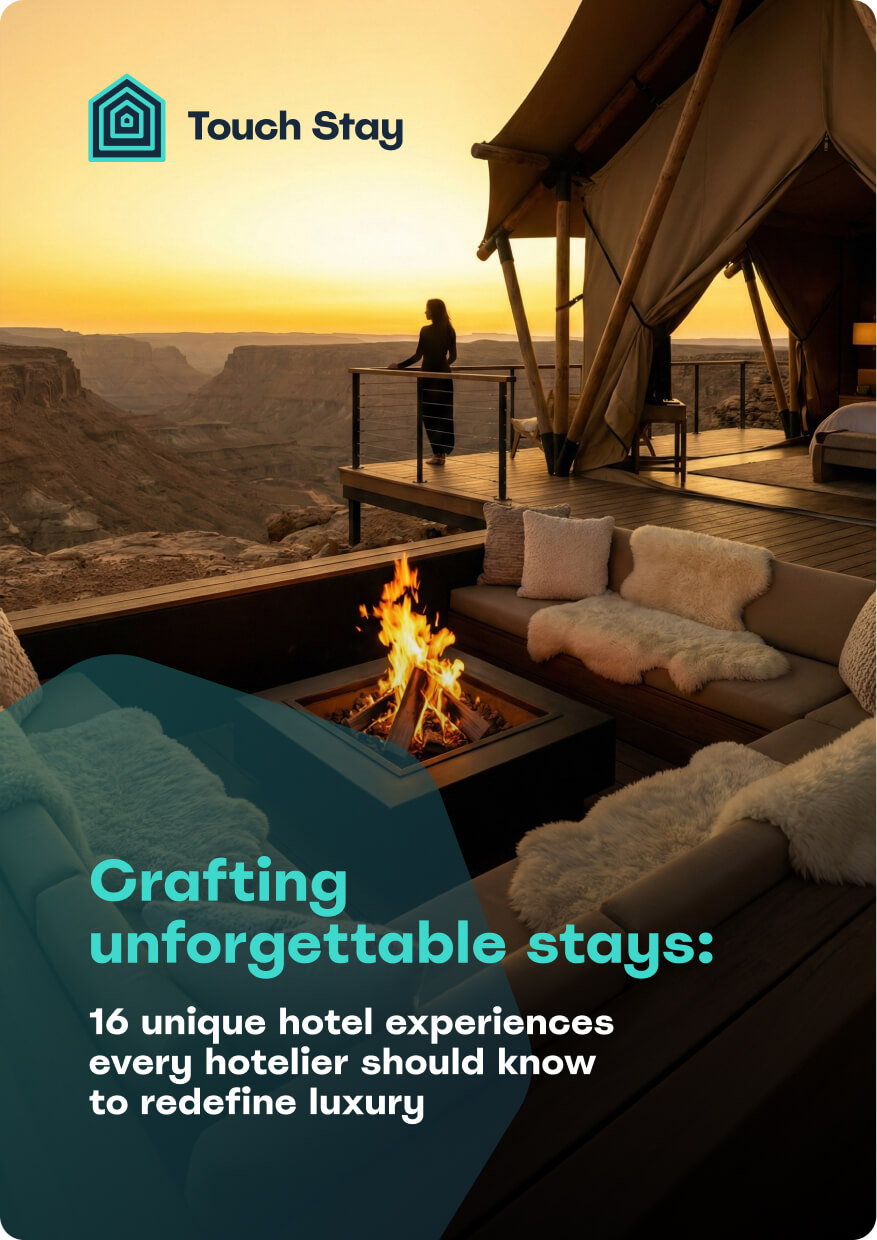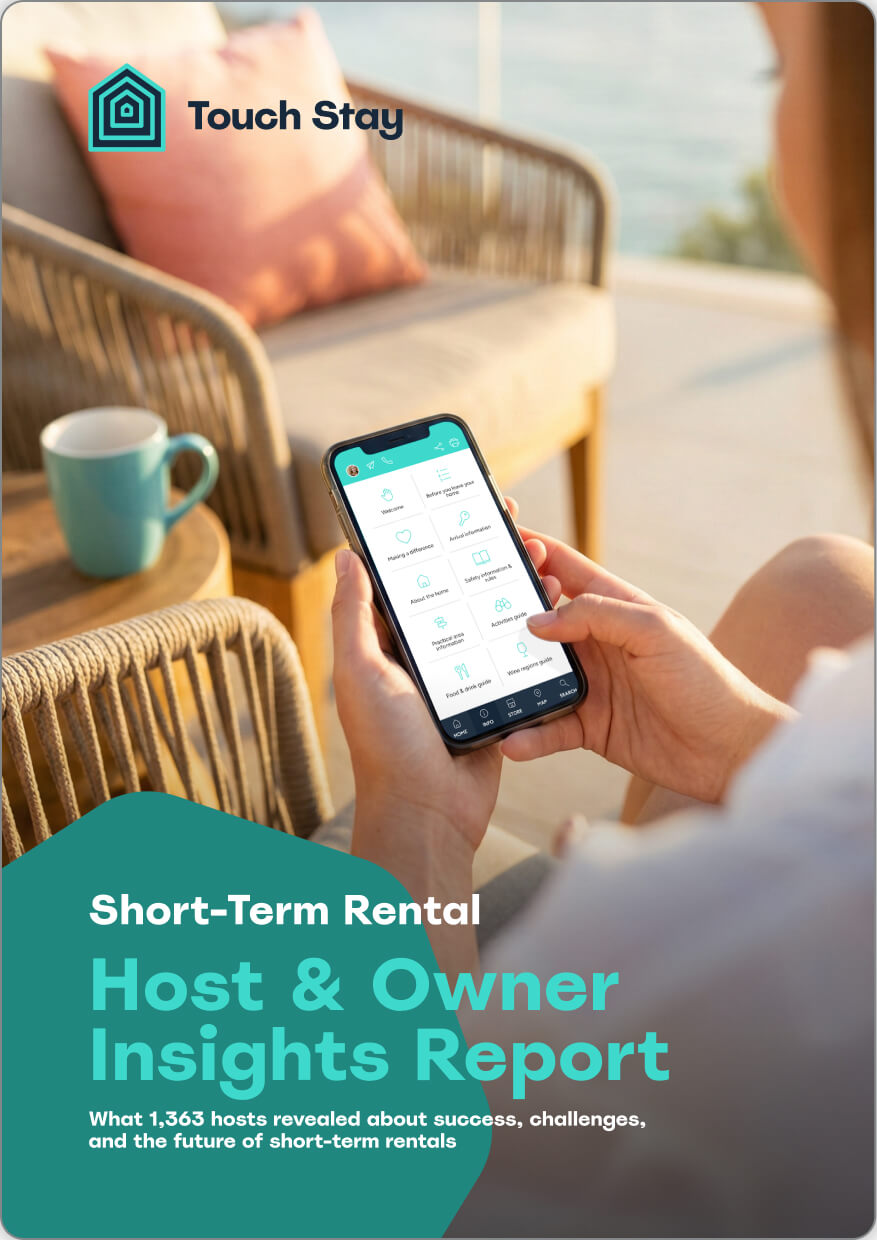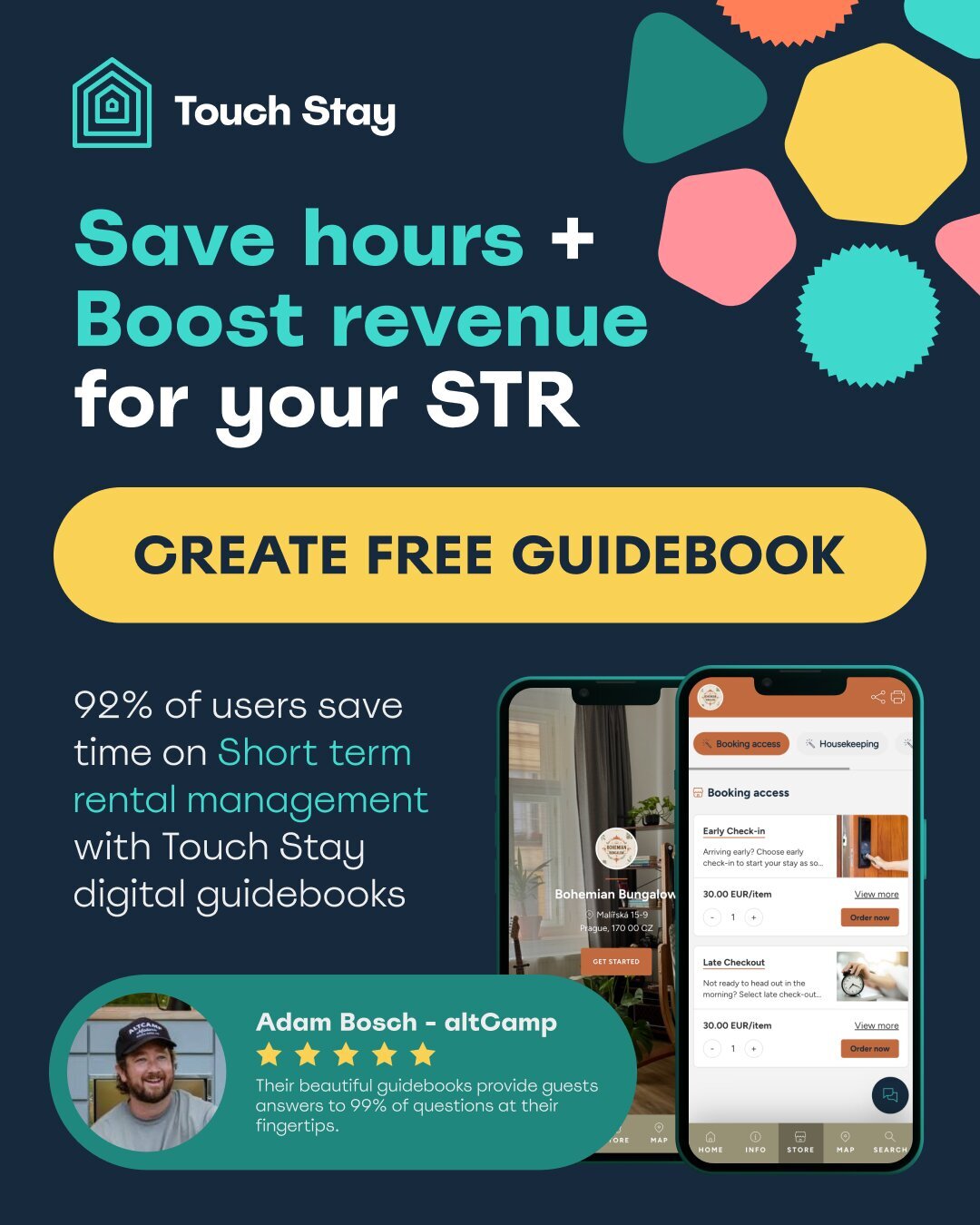Quick answer (TL;DR)
-
Short term rental marketing is the plan that gets you seen, wins direct bookings, and lifts nightly rates.
-
Start here: define your guest personas, shoot pro photos and a short video, list on the right OTAs, launch a fast direct booking site, set up local SEO and a small PPC test.
-
Automate the engine: enable dynamic pricing, schedule guest messages, collect emails, and use a digital guidebook to cut questions and boost reviews.
-
Track what matters: occupancy, ADR, RevPAR, direct booking share, response time, review score.
-
Helpful tools: a PMS for sync, Mangools for SEO and AI search tracking, Warmup Inbox and EmailListVerify for email deliverability, Touch Stay for guidebooks.
The short-term rental world is far more competitive than it used to be. What began as a simple way to earn extra income has grown into a fast-paced industry with higher expectations and stronger pressure to stand out.
Hosts across the UK now manage everything from cottages in Cornwall to modern flats in Central London and full portfolios spread across regions. Listing on a major OTA and waiting for bookings isn’t enough on its own anymore. Marketing has become a core part of running a successful short-term rental business.
Stronger marketing leads to higher occupancy, better nightly pricing, and more direct bookings. The sections that follow break down the practical steps, tactics, and tools that help hosts move from basic operations to a profitable, well-run STR business.
Here’s what you’ll learn about short-term rental marketing:
- Why you need a short-term vacation rental marketing strategy
- 14 essential short-term marketing strategies you can implement today
- Key takeaways to guarantee success
- Summary
Before we dive into the details, if you’re looking for the ultimate tool to boost your guest experience and drive stellar reviews, start your free trial of Touch Stay today.
Why do you need a short term vacation rental marketing strategy?
The marketplace is saturated. From professional property management companies to accidental landlords, everyone is vying for the same pool of guests. Relying solely on platforms like Airbnb or Booking.com leaves you vulnerable to their constantly changing algorithms and high commission fees.
A dedicated short-term rental marketing strategy gives you control, visibility and profitability. Here are three major reasons why you need one now:
a) Online presence
Your online presence is the face of your business. If potential guests can only find you on one OTA, you risk looking like a hobbyist. A well-rounded strategy gets you to show up across multiple channels, making you look professional, established and trustworthy.
- This includes your own website, social media and specialised listing sites.
- Building a strong online foundation is the first step toward creating a brand that guests will remember and actively seek out, separating yourself from the noise of generic listings.
b) Higher attractiveness
A great location and comfortable furnishings are standard; they don't help you stand out. A focused marketing strategy allows you to define and highlight your unique selling points (USPs).
- Consistently showcase what makes your property special through high-quality marketing materials.
- Highlight things like exceptional amenities, unparalleled local knowledge, or a smooth booking and check-in process.
- By doing this, you immediately become a more attractive option compared to competitors who offer a more basic or transactional experience.
c) More bookings
This is the ultimate goal, isn't it? A well-executed vacation rental marketing plan is a direct pipeline to a higher volume of bookings, especially direct ones, which bypass OTA commissions entirely.
- When you master SEO, social media and email marketing, you stop relying on someone else’s platform to send you business.
- Instead, you create your own stream of ideal guests, leading to greater control over pricing and availability.
- Ultimately, this results in significantly increased revenue for your short-term rental business.
14 Short-term marketing strategies
It’s time to roll up your sleeves and get tactical. Here are 14 actionable, modern, and effective strategies to revolutionise your STR marketing efforts and secure more bookings.
1. Define and target your audience
Before spending a single penny on advertising, you must know who you are trying to reach.
- Are you targeting young families looking for child-friendly amenities?
- Digital nomads needing high-speed internet and quiet workspaces?
- Luxury travellers seeking high-end services?
Creating detailed 'guest personas' allows you to tailor your property's styling, your listing copy, your pricing, and your advertising channels directly to the people most likely to book and enjoy their stay. A niche focus is far more powerful than a broad approach in the competitive short-term rental market.
2. Create professional photos and videos
In the short-term rental market, visual appeal is everything. Guests scroll quickly, and a low-quality photo is an instant dealbreaker.
- Invest in professional photography that captures the natural light, the best features, and the overall vibe of your property.
- Go one step further with a high-quality video walkthrough or a short reel showcasing the local area.
- Visual content is your 24/7 salesperson, so make sure it’s doing your property justice and highlight the unique aspects you defined in your target audience profile.
3. List your short term rentals on the right platforms
While Airbnb, Booking.com, and Vrbo dominate, don't ignore niche platforms.
- Depending on your target audience, you might find better success on sites dedicated to specific demographics, like luxury rentals, pet-friendly accommodation, or corporate housing.
- Additionally, consider local tourism board websites or regional listing sites.
- The goal isn't just to be everywhere, but to be highly visible where your ideal guest is actively looking to book their holiday.
4. Create your own website
Your own website is the cornerstone of a serious short-term rental marketing operation.
- It is the only channel where you have 100% control over the narrative, the booking experience and the commission rate (which is zero!)
- A professional, mobile-friendly website that integrates a direct booking engine is essential for converting lookers into bookers.
- Use it to showcase your best content, share testimonials, and tell your unique brand story in a way that OTA listings simply cannot manage. This is how you build equity in your own brand, not someone else's.
5. Focus on local SEO and PPC
Search Engine Optimisation (SEO) is how you ensure your website appears high up on Google when a guest searches for "short-term rental near [your location]".
- Focus intensely on local SEO: optimising your Google My Business profile, building local citations, and using location-specific keywords in your website copy.
- For faster results, consider running targeted Pay-Per-Click (PPC) campaigns for specific, high-intent terms.
- Managing your keyword research and tracking your ranking can feel daunting, but tools like the Mangools suite provide an accessible, all-in-one platform for keyword research, backlink analysis and rank tracking, making it easier for property managers to compete with the big boys in the organic search results.
6. Boost your online presence in AI search engines
The way people search online is evolving rapidly, with AI-powered search engines and conversational interfaces playing a greater role. The future of search results involves snippets, summaries, and direct answers generated by Artificial Intelligence.
- Ensure your website content is highly structured, factual, and answers common guest questions clearly.
- To monitor how AI search engines are interpreting your brand and listings, the Mangools AI Search Watcher tool is an indispensable resource
- It tracks and analyses AI-generated search snippets, giving you the competitive intelligence needed to optimise your content specifically for the next generation of search.
7. Utilise email marketing
Email marketing is one of the most cost-effective STR marketing channels for building loyalty and securing repeat bookings.
- Capture emails from enquiries, past guests and website visitors.
- Use segmented lists to send personalised content: local event updates, special offers, or 'we miss you' discounts.
- To ensure a high delivery rate, tools like Warmup Inbox can help establish a positive sender reputation.
- Additionally, regularly using a verification service like EmailListVerify is essential to keep your email data clean and effective, maximising your return on investment.
8. Choose dynamic pricing
Setting one static price for the whole year is a sure-fire way to lose revenue. Dynamic pricing uses algorithms to adjust your nightly rate based on real-time market demand.
- Factors include local events, season, competitor pricing, and day of the week.
- This allows you to maximise revenue during peak times and fill gaps during low season by offering competitive rates.
- Implementing a dynamic pricing tool is perhaps the single fastest way to boost your profit without changing anything else about your property or your short-term rental marketing efforts.
Pro tip: find out more about how dynamic pricing can maximise your STR revenue.
9. Reach out to social media influencers
Identifying local micro-influencers, those with highly engaged but smaller audiences, can be a surprisingly effective way to promote your property.
- Offer a complimentary stay in exchange for authentic content creation, such as photos, videos, or blog posts.
- This generates trust-worthy social proof and exposes your property to a ready-made, highly relevant audience, often at a fraction of the cost of traditional advertising.
- Authenticity is key here; a genuine endorsement is priceless.
Pro tip: discover 15 inspirational influencers short-term rental hosts need to follow.
10. Focus on obtaining positive reviews and ratings
Reviews are the social currency of the short-term rental world. Focus on providing an exceptional experience that compels guests to leave five-star feedback.
- This process starts long before they check-in and continues long after they leave.
- Actively solicit reviews through friendly, timed post-stay emails.
- Always respond to every piece of feedback, positive or negative, in a professional and constructive manner.
- The more (and better) your reviews, the higher your listings will rank on every platform, making this a passive, yet essential, form of marketing.
11. Create your own business cards
While much of vacation rental marketing is digital, don't forget the power of tangible, physical assets.
- A high-quality business card left for guests, or placed at local businesses (cafés, shops, and attractions), provides a simple, physical reminder of your brand.
- Include your direct booking website URL and a QR code for easy scanning.
- This small, professional touch encourages repeat business, word-of-mouth referrals, and helps guests remember where to find you next time they plan a trip.
12. Create and use digital guidebooks like Touch Stay
This strategy is about marketing through experience – the most powerful kind of marketing there is. A Touch Stay digital guidebook is a beautifully designed, mobile-friendly hub for all the essential information your guests need.
- Imagine cutting down on 90% of those repetitive 'where is the Wi-Fi code?' or 'how does the dishwasher work?' messages.
- By providing instant, comprehensive answers and curated local recommendations, you save yourself hours of time and immediately elevate the guest experience.
- This level of service leads directly to glowing five-star reviews, repeat business and powerful word-of-mouth marketing – all of which are invaluable components of a winning short-term rental marketing strategy.

Ready to stop answering the same questions and start wowing your guests?
Touch Stay digital guidebooks save time, enhance experience and drive better reviews.
13. Join vacation rental forums
Engaging with the community isn't just about learning; it’s about establishing your brand authority.
- Participate actively in online forums, Facebook groups and industry events related to short-term rental management.
- Share genuine, helpful advice and insights.
- By becoming a respected voice, you build trust and recognition within the industry. While direct solicitation is often frowned upon, having a credible profile naturally leads to interested parties seeking out your own property or services.
14. Offer special deals and packages
Incentivise bookings, especially during shoulder and low seasons, by creating attractive packages.
- Consider partnerships with local businesses (such as a discounted meal at a nearby restaurant, tickets to a local museum, or a complimentary bottle of wine).
- Offering a 'work-from-home' package with improved desk space and coffee, or a 'romantic getaway' bundle with flowers and late check-out, can differentiate your offering.
- These limited-time deals generate urgency and provide an extra reason for guests to book your property over a competitor’s.
Pro tip: check out the Touch Stay Upsell widget to maximise revenue and guest satisfaction!

Key takeaways
Success in short-term rental marketing isn’t found in a single magic bullet; it's the cumulative effect of applying multiple, consistent strategies. The shift to direct bookings requires you to think like a professional marketer, not just a property owner.
The most critical takeaway is the focus on brand experience. Every touchpoint is a marketing opportunity:
- Professional visuals set expectations.
- Strategic SEO ensures visibility.
- Seamless communication, especially through a tool like a Touch Stay digital guidebook, builds loyalty.
All these elements work in concert to build a premium brand reputation that justifies higher rates and attracts more loyal guests. Start small, be consistent, and never underestimate the power of stellar guest service as a marketing strategy.
Summary
A proactive and diverse vacation rental marketing plan is non-negotiable for long-term success in the competitive STR market. By defining your ideal guest, investing in professional presentation, optimising your online visibility (both traditionally and through new AI search channels), and fostering deep guest loyalty via exceptional experiences, you can dramatically increase your occupancy and profit margins.
Implementing these 14 strategies moves you from simply listing a room to running a sophisticated business. The goal is to shift from being reliant on OTAs to building an independent, direct-booking business powered by a memorable guest experience. Take control of your visibility, leverage technology for efficiency, and let your exceptional service do the selling.
Stop just managing a property and start building a brand.
Take the first step towards a five-star guest experience today.

Ned
Ned has clocked up over 11 years in digital marketing and comms, with a strong focus on creating engaging content for a range of brands and agencies. When he’s not writing, he can be found digging for records, peering through his telescope at the night sky, or onboard his local lifeboat where he volunteers as a crewmember.
Be the first to know!
Join our newsletter for early access to:
- ✅ Free guides
- ✅ Pro tips & tricks
- ✅ Time saving tutorials
- ✅ Latest blog posts
- ✅ Checklists & templates






















